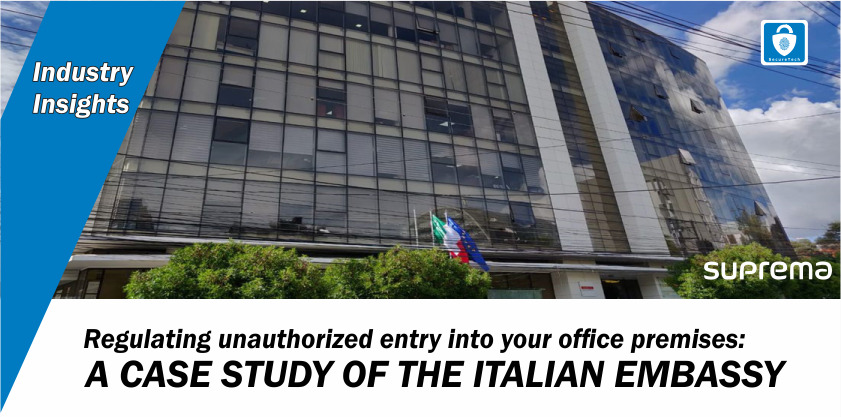Suprema Case Study
 Suprema Case Study – Italian Embassy[Bolivia]
Suprema Case Study – Italian Embassy[Bolivia]
THE CUSTOMERJune 2019, a new office for the Italian Embassy was opened to public in “La Paz” City, located in the “Calacoto” area. In this new infrastructure, there are the Italian Embassy and Consulate where a large influx of people are looking for visas, visitors for other purposes and Italian citizens. For this reason, the security on site needed to be guaranteed for both the Embassy and Consulate personnel as well as for the people who visit the facility.
THE CHALLENGENumrous offices of the Italian Embassy and the Consulate were inter-conncted through corridor and emergency exit on the site. Access Levels were required to control the access of those going back and forth from the Embassy to the Consulate and vice versa. The main concern was to control entrances from public area to restricted area by allowing access to authorized personnel only. For this purpose, access control was required. The Biometric Access Control Platform must be able to monitor the sate of doors visually and allow administrators to control the doors manually by anytime. Due to the nature of international institution, Access control platform had to meet the international security standards.
THE SOLUTIONA CoreStation was installed to use the Anti Passback function (among other features). In order to have control of all people coming and going from one place to another within the Embassy-Consulate areas. Biostar 2.7 was implemented in this project, which already incorporates the Graphic Map module (with an Advanced license). This helps the security team to visualize all the existing events in the two offices (Embassy, Consulate) graphically. For both the entrances of the Embassy and Consulate, two Biostation A2 were installed. In this case, the A2 devices performed as Access control and intercom by connecting SIP to A2. Four armored doors were installed, with two BioEntry R2 devices per door, these are connected via RS-485 to the CoreStation. The personnel have access to the doors through the CoreStation. Each door has a special emergency exit button connected to controller which can be opened by the allowed personnel in emergencies. an emergency situation. The personnel working at the Embassy and Consulate have the option of either using Biometrics (fingerprint), or Card (RFID). The access through the BioStar 2 Mobile Card (Smart Card) is enabled only for the ambassador and the Delegate of the Military Police.
KEY BENEFITSImplementing a biometric-enabled centralized door controller CoreStagion provides the advantages in terms of for both security and cost-effectiveness. Because it enhanced security level as no user information and logs are saved in BioEntry R2 reader and reduced costs of additional Ethernet wiring to download template to BioEntry R2 reader.
THE CHALLENGENumrous offices of the Italian Embassy and the Consulate were inter-conncted through corridor and emergency exit on the site. Access Levels were required to control the access of those going back and forth from the Embassy to the Consulate and vice versa. The main concern was to control entrances from public area to restricted area by allowing access to authorized personnel only. For this purpose, access control was required. The Biometric Access Control Platform must be able to monitor the sate of doors visually and allow administrators to control the doors manually by anytime. Due to the nature of international institution, Access control platform had to meet the international security standards.
THE SOLUTIONA CoreStation was installed to use the Anti Passback function (among other features). In order to have control of all people coming and going from one place to another within the Embassy-Consulate areas. Biostar 2.7 was implemented in this project, which already incorporates the Graphic Map module (with an Advanced license). This helps the security team to visualize all the existing events in the two offices (Embassy, Consulate) graphically. For both the entrances of the Embassy and Consulate, two Biostation A2 were installed. In this case, the A2 devices performed as Access control and intercom by connecting SIP to A2. Four armored doors were installed, with two BioEntry R2 devices per door, these are connected via RS-485 to the CoreStation. The personnel have access to the doors through the CoreStation. Each door has a special emergency exit button connected to controller which can be opened by the allowed personnel in emergencies. an emergency situation. The personnel working at the Embassy and Consulate have the option of either using Biometrics (fingerprint), or Card (RFID). The access through the BioStar 2 Mobile Card (Smart Card) is enabled only for the ambassador and the Delegate of the Military Police.
KEY BENEFITSImplementing a biometric-enabled centralized door controller CoreStagion provides the advantages in terms of for both security and cost-effectiveness. Because it enhanced security level as no user information and logs are saved in BioEntry R2 reader and reduced costs of additional Ethernet wiring to download template to BioEntry R2 reader.
Coppied form Suprema

